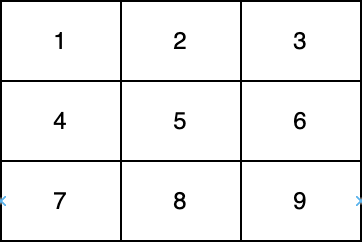Problem
You are given a 0-indexed two-dimensional integer array nums.
Return **the largest *prime* number that lies on at least one of the diagonals of nums. In case, no prime is present on any of the diagonals, return 0.**
Note that:
- An integer is prime if it is greater than
1and has no positive integer divisors other than1and itself. - An integer
valis on one of the diagonals ofnumsif there exists an integerifor whichnums[i][i] = valor anifor whichnums[i][nums.length - i - 1] = val.

In the above diagram, one diagonal is [1,5,9] and another diagonal is** [3,5,7]**.
Example 1:
Input: nums = [[1,2,3],[5,6,7],[9,10,11]]
Output: 11
Explanation: The numbers 1, 3, 6, 9, and 11 are the only numbers present on at least one of the diagonals. Since 11 is the largest prime, we return 11.
Example 2:
Input: nums = [[1,2,3],[5,17,7],[9,11,10]]
Output: 17
Explanation: The numbers 1, 3, 9, 10, and 17 are all present on at least one of the diagonals. 17 is the largest prime, so we return 17.
Constraints:
1 <= nums.length <= 300nums.length == numsi.length1 <= nums[i][j] <= 4*106
Solution (Java)
class Solution {
public int diagonalPrime(int[][] nums) {
fill();
int n = nums.length;
int max = 0;
for (int i = 0; i < n; i++) {
if (p[nums[i][i]]) {
max = Math.max(max, nums[i][i]);
}
if (p[nums[i][n - i - 1]]) {
max = Math.max(max, nums[i][n - i - 1]);
}
}
return max;
}
boolean[] p = new boolean[4 * 1000000 + 1];
private void fill() {
Arrays.fill(p, true);
int n = 4 * 1000000;
for (int i = 2; i * i <= n; i++) {
if (!p[i]) continue;
for (int j = 2 * i; j <= n; j += i) {
p[j] = false;
}
}
p[0] = p[1] = false;
}
}
Explain:
nope.
Complexity:
- Time complexity : O(n).
- Space complexity : O(n).